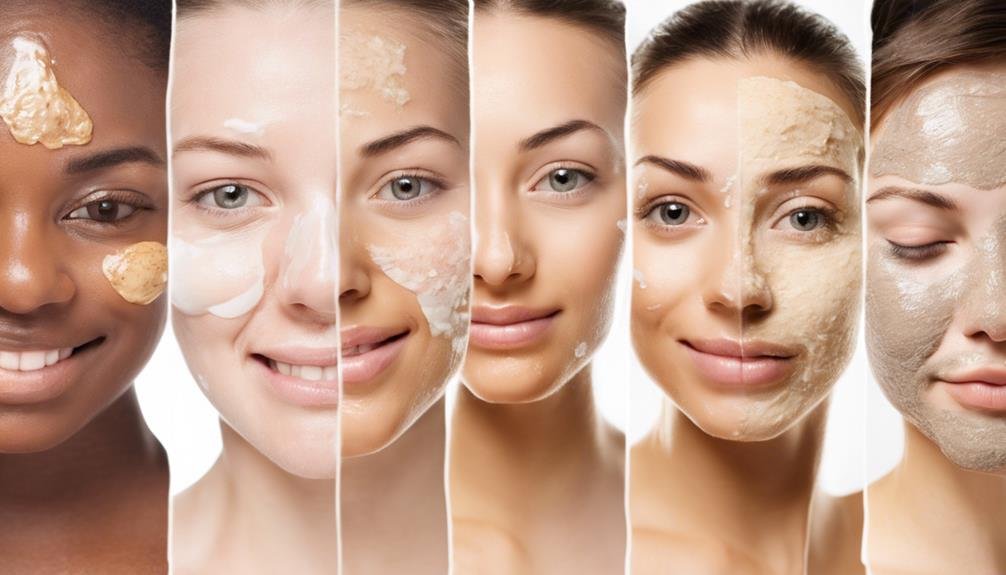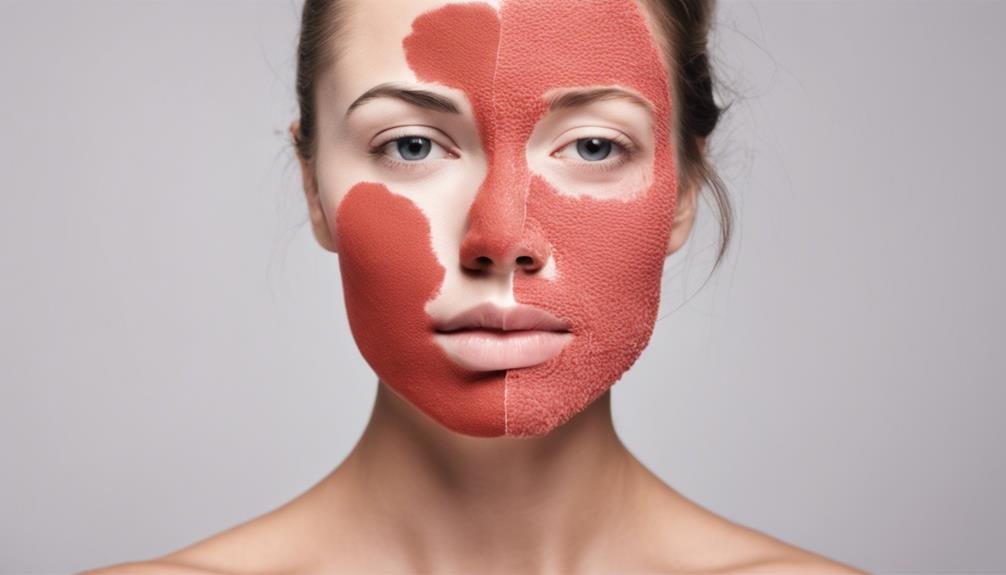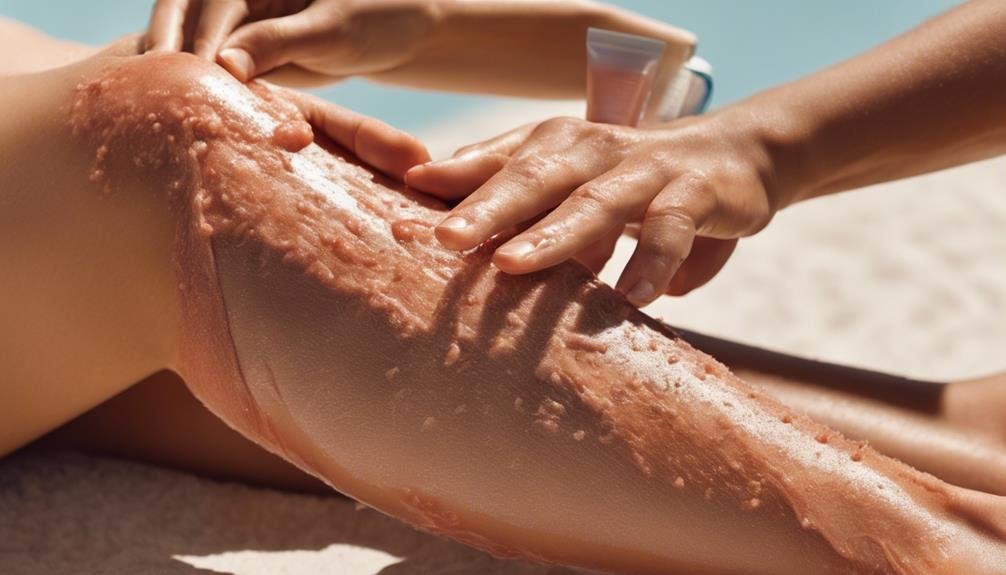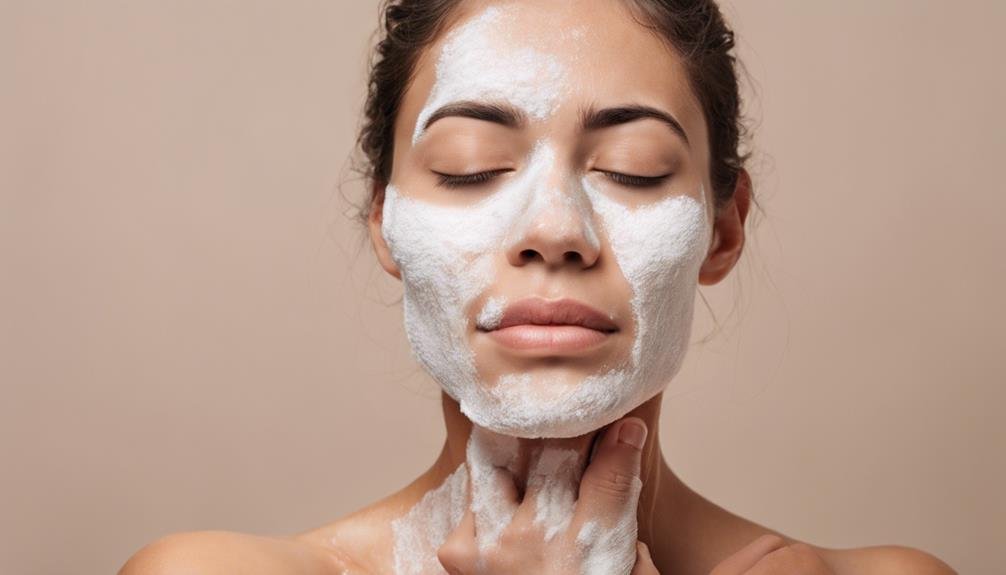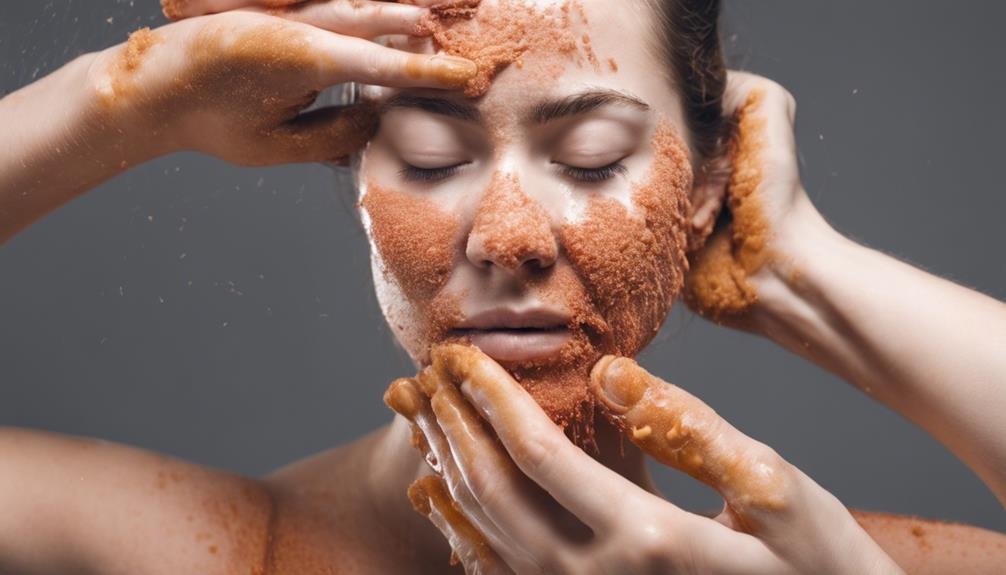You might be surprised to learn that some of the common exfoliation mistakes many people make could be hindering your skincare progress. Over-enthusiastic scrubbing and using abrasive products might seem beneficial but can actually harm your skin in the long run. Not paying attention to specific details like your skin type or the timing of your exfoliation routine could be standing in the way of achieving that radiant glow you desire. Stay tuned to discover the key mistakes to avoid and ensure your skincare routine is on the right track for healthy, glowing skin.
Key Takeaways
- Avoid over-exfoliating to prevent irritation and damage.
- Use gentle exfoliants to avoid damaging the skin barrier.
- Tailor exfoliation to your skin type for effectiveness.
- Wait until skin is dry before exfoliating to reduce sensitivity.
- Avoid exfoliating active breakouts to prevent worsening skin conditions.
Over-Exfoliating
If you find yourself reaching for that exfoliator more often than not, you may be guilty of over-exfoliating your skin. While exfoliation is essential for maintaining healthy skin by removing dead cells and promoting cell turnover, excessive exfoliation can lead to irritation, redness, and even damage to the skin barrier.
Over-exfoliating can disrupt the skin's natural balance, causing dryness, sensitivity, and an increase in oil production as a reactive response. Signs that you may be overdoing it include persistent redness, stinging, increased sensitivity, or a feeling of tightness after exfoliation. If you notice these symptoms, it's crucial to dial back on the frequency of exfoliation and opt for gentler products.
To prevent over-exfoliation, it's recommended to follow the instructions provided with your exfoliating product and to listen to your skin's needs. Typically, exfoliating 1-3 times a week is sufficient for most skin types. Remember, moderation is key when it comes to exfoliation to maintain a healthy and radiant complexion.
Using Harsh Scrubs
When it comes to exfoliation, using harsh scrubs can do more harm than good to your skin. Harsh scrubs can cause irritation, redness, and even micro-tears in the delicate skin on your face. Here are some reasons why you should avoid using harsh scrubs:
- Damage to skin barrier: Harsh scrubs can disrupt the skin's natural barrier, leading to increased sensitivity and dryness.
- Aggravation of skin conditions: If you have conditions like acne or rosacea, abrasive scrubs can worsen inflammation and exacerbate these issues.
- Accelerated aging: Over-exfoliating with harsh scrubs can break down collagen and elastin, speeding up the aging process.
- Uneven skin tone: Scrubbing too harshly can cause post-inflammatory hyperpigmentation, leaving your skin discolored and uneven.
Instead of harsh scrubs, opt for gentler exfoliants like chemical exfoliators or cleansing brushes to achieve smooth and radiant skin without causing harm. Your skin deserves gentle care to maintain its health and beauty.
Ignoring Skin Type
Amidst your skincare routine, overlooking your skin type can significantly impact the effectiveness and safety of your exfoliation practices. Your skin type plays a crucial role in determining which exfoliation method is best suited for you. Dry skin may benefit from gentler exfoliants like lactic acid, while oily skin might respond better to salicylic acid. Ignoring your skin type can lead to over-exfoliation, causing irritation, redness, and even damage to the skin barrier.
Understanding your skin type involves recognizing whether you have dry, oily, combination, sensitive, or normal skin. Dry skin tends to be flaky and may feel tight, while oily skin is prone to excess oil production and acne. Combination skin exhibits characteristics of both dry and oily skin, while sensitive skin is easily irritated and may react negatively to certain exfoliants.
Tailoring your exfoliation routine to your specific skin type ensures that you achieve the desired results without causing harm. Consulting with a dermatologist can help you identify your skin type accurately and choose the most suitable exfoliation products for a healthy and radiant complexion.
Exfoliating Wet Skin
To optimize the benefits of exfoliation, it's essential to consider the state of your skin during the process. When it comes to exfoliating wet skin, there are some key points to keep in mind:
- Increased Sensitivity: Exfoliating wet skin can lead to increased sensitivity as water softens the skin, making it more prone to irritation.
- Reduced Effectiveness: Exfoliating on wet skin may dilute the exfoliant, reducing its effectiveness in removing dead skin cells.
- Risk of Over-Exfoliation: Exfoliating wet skin can make it easier to over-exfoliate, leading to dryness, redness, and even breakouts.
- Optimal Timing: Wait until your skin is dry before exfoliating to ensure the exfoliant can work effectively without causing unnecessary irritation.
Skipping Patch Test
Failing to conduct a patch test before incorporating a new exfoliant into your skincare routine can have potentially adverse effects on your skin. Patch testing involves applying a small amount of the exfoliant behind your ear or on the inner side of your arm to check for any negative reactions. By skipping this crucial step, you risk exposing your entire face to possible irritation or allergic reactions.
Even if a product claims to be gentle or suitable for sensitive skin, individual skin chemistry varies, and what works for one person may not work for another. Allergic reactions, redness, itching, or even severe breakouts can occur when introducing a new exfoliant without prior testing.
Taking a few minutes to patch test can save you from days or even weeks of discomfort and potential damage to your skin.
Exfoliating Active Breakouts
Navigating skincare routines during breakouts can be challenging, especially when it comes to exfoliating active breakouts. When dealing with blemishes, it's essential to approach exfoliation carefully to avoid worsening the condition. Here are some tips to help you navigate exfoliating during active breakouts:
- Gentle Formulas: Opt for exfoliants with mild ingredients like salicylic acid or lactic acid to avoid irritating the skin further.
- Avoid Harsh Scrubs: Stay away from abrasive scrubs that can cause micro-tears on the skin and lead to more breakouts.
- Limited Frequency: Limit exfoliation to 1-2 times a week to prevent over-exfoliation, which can strip the skin's natural barrier.
- Patience is Key: Allow the breakout to heal before resuming regular exfoliation to prevent exacerbating the issue.
Exfoliating Sunburned Skin
When dealing with sunburned skin, it's crucial to approach exfoliation with caution to prevent further damage and irritation. Exfoliating sunburned skin can exacerbate the already compromised skin barrier, leading to increased redness, peeling, and discomfort. The best course of action is to allow the skin to heal naturally without any aggressive exfoliation.
Exfoliating products containing harsh ingredients like physical exfoliants (such as scrubs with rough particles) or chemical exfoliants (like AHAs or BHAs) should be avoided on sunburned skin. These ingredients can further irritate the skin, delay the healing process, and increase the risk of infection.
Instead, focus on gentle skincare practices like using a mild cleanser, applying a soothing moisturizer, and keeping the skin hydrated with a gentle, non-irritating sunscreen. Allow the skin to recover fully before reintroducing exfoliation into your skincare routine. Remember, patience and gentle care are key when it comes to healing sunburned skin.
Using Expired Products
Using expired skincare products can pose risks to your skin's health and overall well-being. When products expire, their effectiveness diminishes, and they can even become harmful to your skin. Here are some reasons why you should avoid using expired skincare products:
- Decreased Effectiveness: Expired products may not work as intended, leading to unsatisfactory results.
- Bacterial Growth: Over time, expired products can harbor bacteria, increasing the risk of infections and breakouts.
- Skin Irritation: Expired ingredients can cause irritation, redness, and allergic reactions on your skin.
- Reduced Safety: The chemical composition of expired products may change, potentially harming your skin instead of providing benefits.
To ensure the best outcomes for your skin, always check the expiration dates on your skincare products and discard any that have passed their prime. Your skin deserves the best care, so prioritize using fresh and safe products for a healthy and glowing complexion.
Overlooking Neck and Chest
Ensuring comprehensive skincare involves more than just focusing on your face. Your neck and chest are often neglected areas when it comes to exfoliation, but they are just as important in maintaining a youthful appearance and healthy skin. The skin on your neck and chest is delicate and prone to showing signs of aging, making regular exfoliation crucial in your skincare routine.
To highlight the significance of exfoliating your neck and chest, consider the following:
| Neglecting These Areas | Importance of Exfoliation |
|---|---|
| Can lead to premature aging | Helps remove dead skin cells |
| Increases the risk of uneven skin tone | Stimulates cell turnover |
| Contributes to the formation of wrinkles | Improves product absorption |
| Results in a lackluster appearance | Enhances overall skin texture |
Exfoliating Fragile Areas
Have you ever considered the intricacies of exfoliating fragile areas on your skin? It's essential to be gentle and cautious when exfoliating delicate areas to avoid irritation and damage. Here are some tips to help you navigate exfoliation in these sensitive regions:
- Choose Gentle Exfoliants: Opt for mild exfoliants like enzyme-based or gentle chemical exfoliants to avoid causing harm to fragile areas.
- Use Light Pressure: Apply only gentle pressure when exfoliating fragile areas to prevent unnecessary stress on the skin.
- Avoid Harsh Scrubs: Steer clear of abrasive scrubs with large particles that can cause micro-tears on delicate skin.
- Limit Frequency: Exfoliate fragile areas less frequently than the rest of your skin to prevent over-exfoliation and irritation.
Exfoliating Already Irritated Skin
When dealing with already irritated skin, the approach to exfoliation requires extra care and attention. Exfoliating irritated skin can further aggravate the condition, leading to increased redness, inflammation, and discomfort. It's essential to avoid harsh exfoliants such as physical scrubs or chemical peels when your skin is already irritated.
Instead, opt for gentle exfoliation methods like mild chemical exfoliants containing ingredients such as lactic acid or fruit enzymes. These options can help slough off dead skin cells without causing additional irritation. Patch testing any new products on a small area of skin can help you determine if they're suitable for your sensitive skin.
Additionally, consider reducing the frequency of exfoliation when your skin is irritated. Giving your skin time to heal and recover is crucial in preventing further damage.
Always follow up with a soothing moisturizer to help restore hydration and support the skin's barrier function. By treating your irritated skin with extra care during exfoliation, you can promote healing and maintain a healthy complexion.
Not Moisturizing After Exfoliation
After exfoliating your skin, moisturizing is a crucial step that shouldn't be overlooked. Failing to moisturize after exfoliation can lead to dryness, irritation, and even more pronounced signs of aging. Here's why moisturizing post-exfoliation is essential:
- Restores Hydration: Exfoliation can strip away the skin's natural oils, leading to dryness. Moisturizing helps replenish lost moisture and maintains skin balance.
- Soothes Irritation: Exfoliation can sometimes cause mild irritation or redness. Moisturizing with a gentle, hydrating formula can help calm the skin.
- Enhances Results: Properly moisturized skin allows for better absorption of subsequent skincare products, maximizing their effectiveness.
- Supports Skin Barrier: Moisturizing after exfoliation strengthens the skin's barrier function, protecting it from environmental stressors and maintaining its overall health.
Frequently Asked Questions
Can Exfoliation Help With Reducing Acne Scars?
Exfoliation can indeed help reduce acne scars by promoting skin cell turnover and fading hyperpigmentation. Regular exfoliation, when done correctly and gently, can improve the appearance of acne scars over time.
Is It Safe to Exfoliate Sensitive Skin?
Exfoliating sensitive skin can be safe if done gently. Remember, over-exfoliation can lead to irritation and damage. Opt for mild exfoliants like lactic acid or jojoba beads. Always patch test and consult a dermatologist for personalized advice.
How Often Should I Exfoliate My Neck and Chest?
You should exfoliate your neck and chest 1-2 times per week to remove dead skin cells and promote cell turnover. Be gentle to avoid irritation. Follow with moisturizer and sunscreen for healthy, glowing skin.
Can I Exfoliate My Lips for Smoother Texture?
You can exfoliate your lips for a smoother texture. Gently scrubbing with a lip scrub or soft toothbrush can help remove dead skin cells. Follow up with a hydrating lip balm to keep your lips soft and smooth.
Is Exfoliating With Natural Ingredients More Effective?
Using natural ingredients for exfoliation can be effective due to their gentle yet potent properties. Ingredients like sugar, coffee grounds, or fruit enzymes can help slough off dead skin cells and reveal smoother, brighter skin.
Conclusion
Now that you are aware of the common exfoliation mistakes to avoid, you can take the necessary steps to maintain healthy and radiant skin. By being mindful of your exfoliation routine and making small adjustments, you can prevent skin irritation, sensitivity, and damage. Remember, proper exfoliation is key to achieving smooth and glowing skin, so make sure to prioritize skincare practices that benefit your skin in the long run.



